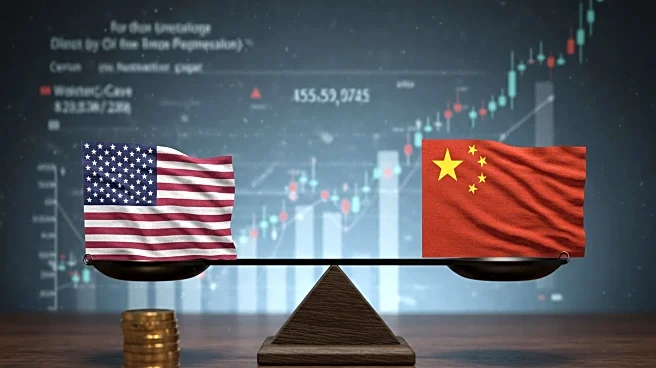What's Happening?
President Trump has implemented a historically aggressive tariff strategy against China, aiming to strengthen the U.S. economy. Despite initial successes, including a rebounding stock market and economic growth, Chinese President Xi Jinping has countered effectively. Xi has maintained China's export dominance and control over rare-earth minerals, crucial for U.S. manufacturing and defense. Trump has recently eased restrictions on AI chip exports to China, a move seen as a concession to Xi. Negotiations have led to reduced tariffs and some concessions from China, such as increased purchases of U.S. soybeans. However, Xi continues to leverage China's resources and export power, holding significant influence over the global market.
Why It's Important?
The ongoing tariff battle between the U.S. and China has significant implications for global trade and economic stability. Trump's strategy aims to protect U.S. industries and generate revenue through tariffs, but it risks escalating tensions with China, a major trading partner. The concessions made by both sides reflect the complex interdependence of their economies. U.S. businesses reliant on Chinese goods face uncertainty, while China's control over rare-earth minerals poses a strategic challenge. The situation impacts global supply chains, affecting industries from electronics to defense. The outcome of this economic confrontation could reshape international trade dynamics and influence future U.S. foreign policy.
What's Next?
Future negotiations between the U.S. and China are likely to focus on further reducing tariffs and addressing export controls. The potential meeting between President Trump and Xi Jinping could lead to new agreements or escalate tensions. U.S. businesses may push for faster access to rare-earth minerals, while China seeks to expand its market reach. The global community will watch closely, as the resolution of this trade conflict could set precedents for international economic relations. Political leaders and industry stakeholders will need to navigate the complexities of this situation to mitigate risks and capitalize on opportunities.
Beyond the Headlines
The tariff strategy highlights broader geopolitical tensions between the U.S. and China, reflecting a struggle for economic and technological supremacy. Ethical considerations arise from the impact on global supply chains and the environment, particularly regarding rare-earth mineral extraction. The situation underscores the need for sustainable trade practices and international cooperation. Long-term shifts may include increased diversification of supply sources and innovation in alternative materials. The evolving relationship between the U.S. and China will continue to influence global economic policies and strategic alliances.









